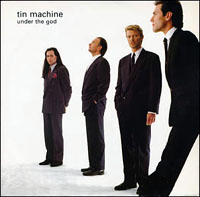
Tin Machine were a British–American rock band formed in 1988, and fronted by English singer-songwriter David Bowie. The band consisted of Bowie on lead vocals, saxophone and guitar; Reeves Gabrels on guitar and vocals; Tony Fox Sales on bass and vocals; and Hunt Sales on drums and vocals. The Sales brothers had previously performed with Bowie and Iggy Pop during the 1977 tour for The Idiot. Kevin Armstrong played additional guitar and keyboards on the band's first and second studio albums and first tour, and American guitarist Eric Schermerhorn played on the second tour and live album Tin Machine Live: Oy Vey, Baby (1992).

Tin Machine is the debut studio album by Anglo-American hard rock band Tin Machine, released on 22 May 1989 through EMI America Records. The band consisted of English singer-songwriter David Bowie, American guitarist Reeves Gabrels and brothers Tony Fox and Hunt Sales on bass and drums, respectively, while Englishman Kevin Armstrong acted as an additional guitarist. The project was spearheaded by Bowie, who felt disconnected in his career by 1987 and looked to reinvent himself. After meeting Gabrels through his Glass Spider Tour, the two agreed to work together and would collaborate frequently for the next decade. Bowie hired the Sales brothers, neither of whom he had worked with since the 1970s, after a meeting in Los Angeles, while English producer Tim Palmer was hired to co-produce.

Tin Machine II is the second and final studio album by Anglo-American rock group Tin Machine, released on 2 September 1991 through Victory Music in association with London Records. The band, composed of English singer-songwriter David Bowie, Reeves Gabrels on guitar and brothers Tony Fox and Hunt Sales on bass and drums, respectively, recorded it in Sydney, Australia in late 1989 at the conclusion of the Tin Machine Tour. After Bowie completed his solo Sound+Vision Tour in late 1990, recording resumed in Los Angeles, California until March 1991. The production was handled by Tin Machine and Tim Palmer, who produced their debut studio album (1989), with additional production by Hugh Padgham on "One Shot". While the album musically retains a hard rock sound, the songs are more melodic compared to its predecessor, with lyrics focusing on love.
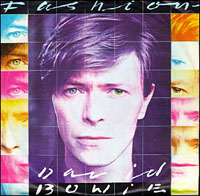
"Fashion" is a song by English musician David Bowie from his 1980 album Scary Monsters . Co-produced by Bowie and Tony Visconti and recorded from February to April 1980 at New York and London, it was the last song completed for the album. Originating as a reggae parody titled "Jamaica", "Fashion" is a post-punk, dance and funk track structurally similar to Bowie's "Golden Years". King Crimson guitarist Robert Fripp contributed lead guitar.

"The Hearts Filthy Lesson" is a song by David Bowie, from his 1995 album Outside, and issued as a single ahead of the album. It showcased Bowie's new, industrial-influenced sound. Lyrically, the single connects with the rest of the album, with Bowie offering a lament to "tyrannical futurist" Ramona A. Stone, a theme continued in subsequent songs. The song is also meant to confront Bowie's own perceptions about the ritual creation and degradation of art. It appears in the end credits of the 1995 film Seven.

Tin Machine Live: Oy Vey, Baby is a live album by Anglo-American rock band Tin Machine, originally released through London Records on 2 July 1992. The album includes songs, all from the band's two albums, recorded between 20 November 1991 and 11 February 1992 from five different venues on the North American and Asian legs of Tin Machine's It's My Life Tour. The maligned album title was intended as a pun on U2's 1991 album Achtung Baby. Oy Vey, Baby has received negative reviews, with many criticising the performances. It failed to chart in both the UK and the US. It was accompanied by a concert video of the same title, which was filmed at The Docks, Hamburg on 24 October 1991. Following its release, Tin Machine disbanded and Bowie quickly resumed his solo career with Black Tie White Noise (1993).
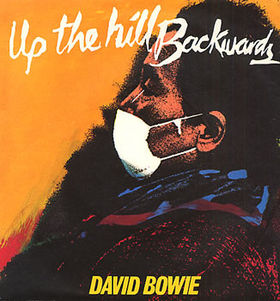
"Up the Hill Backwards" is a song by English musician David Bowie, released on his 1980 album Scary Monsters . It was later issued by RCA Records as the fourth and final single from the album in March 1981. Originally written under the title "Cameras in Brooklyn", the song was recorded between February and April 1980 at the Power Station in New York City and Good Earth Studios in London. The recording features backing vocalists, guitar contributions from Robert Fripp and acoustic guitar played by co-producer Tony Visconti. Lyrically, the song concerns the struggles of facing a crisis, partially influenced by Bowie's divorce from his wife Angie. Musically, the song contains numerous time signature changes and a Bo Diddley-inspired beat.
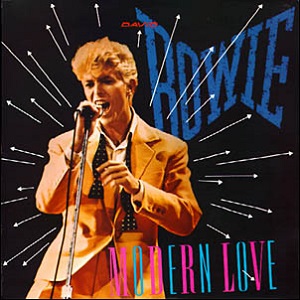
"Modern Love" is a song written by English singer-songwriter David Bowie. It was released as the opening track on his 1983 album Let's Dance and issued as the third single from the album later in the year. Co-produced by Bowie and Nile Rodgers of the American band Chic, it is a rock song that contains elements of new wave music. It was recorded at the Power Station in Manhattan and was one of the first tracks recorded for the album. It was performed by Bowie on the Serious Moonlight Tour, where it often closed the shows. A music video for the song, directed by Jim Yukich and featuring a performance of the song during the tour, was released in 1983 and played frequently on MTV.

"Tin Machine" is a song by Anglo-American hard rock band Tin Machine, and the song from which they took their name, a track from their debut album, also of the same name. It was released as a single in September 1989, as a double A-side with a live cover of Bob Dylan’s “Maggie's Farm”.
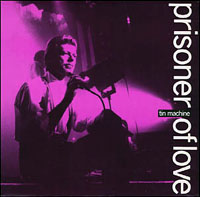
"Prisoner of Love" is a song by Tin Machine taken from their eponymous debut album. It was issued as their third single in October 1989.
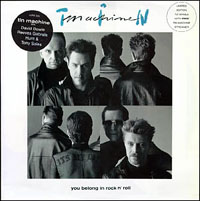
"You Belong in Rock n' Roll" is a song by Anglo-American hard rock band Tin Machine, released ahead of their second album in August 1991. The song was the band’s first release on Victory Records, which was distributed by London Records in the UK.

"Baby Universal" is a song by Anglo-American hard rock band Tin Machine, released as the second single from their Tin Machine II album in October 1991.
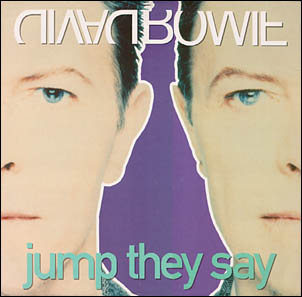
"Jump They Say" is a song by English singer-songwriter and actor David Bowie, from his 18th album, Black Tie White Noise (1993). It was written by Bowie, produced by Nile Rodgers and released as the first single from the album in March 1993. While Bowie opted not to tour for the Black Tie White Noise album, the song was performed on his 1995–96 Outside Tour and released as part of the live concert No Trendy Réchauffé (2020). The accompanying music video for "Jump They Say" was directed by Mark Romanek and received heavy rotation on MTV Europe.

"Look Back in Anger" is a song written by English artists David Bowie and Brian Eno for the album Lodger (1979). It concerns "a tatty 'Angel of Death'", and features a guitar solo by Carlos Alomar.

"Hallo Spaceboy" is a song by David Bowie from his 1995 album Outside, and the third and final single from the album. The track was re-recorded in 1996 and issued as a remix featuring Pet Shop Boys as guest artists. Bowie and Brian Eno co-wrote the original album version of the song.

A Reality Tour is a DVD released in 2004 of David Bowie's performance at Point Theatre in Dublin, Ireland in 2003 during the A Reality Tour.
The Tin Machine Tour was a concert tour headlined by Anglo-American hard rock band Tin Machine. Following a performance of "Heaven's in Here" at the International Music Awards in New York City on 31 May 1989, the tour started on 14 June 1989 at The World in New York City, and finished on 3 July 1989 at The Forum in Livingston, Scotland. The tour comprised 12 performances in six countries, in venues with a capacity of 2,000 or less. Joined onstage by Kevin Armstrong, the band performed the entirety of their eponymous debut album with the exception of "Video Crime", augmented with cover version of songs from Bob Dylan and Johnny Kidd & The Pirates.

The It's My Life Tour was a concert tour headlined by Anglo-American hard rock band Tin Machine. The tour commenced on 5 October 1991 after two warm-up shows, one press show and three trade-industry shows, visiting twelve countries and concluding after seven months and sixty-nine performances, a larger outing than their first tour in 1989.
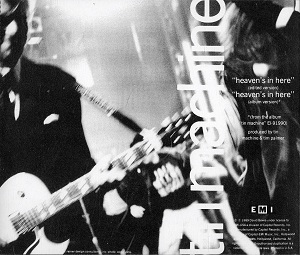
"Heaven's in Here" is the lead track from the eponymous debut album by the Anglo-American hard rock band Tin Machine. Written by David Bowie, it was released as a promotional lead single from the album in 1989.

"One Shot" is the second track from the album Tin Machine II by Tin Machine. It was released as the third single from the album, making it their sixth single overall, and the last single released by the band.
